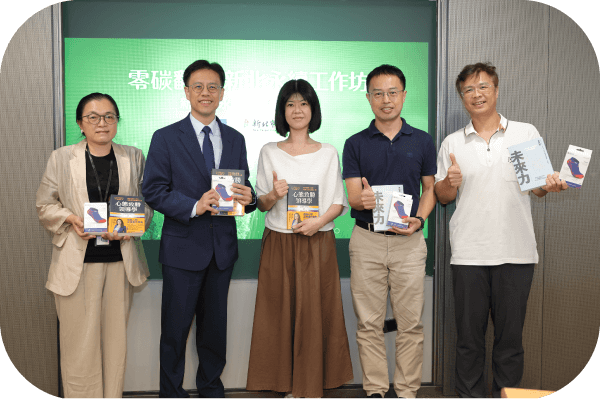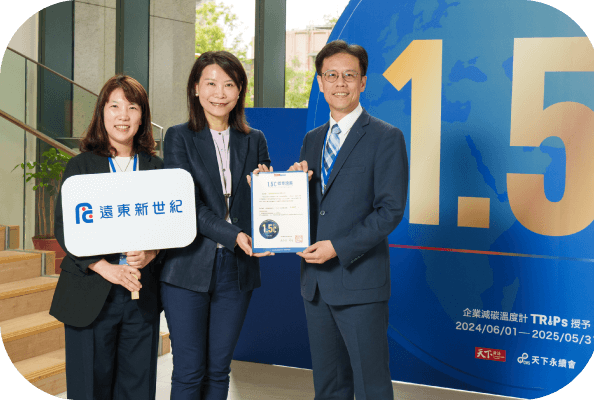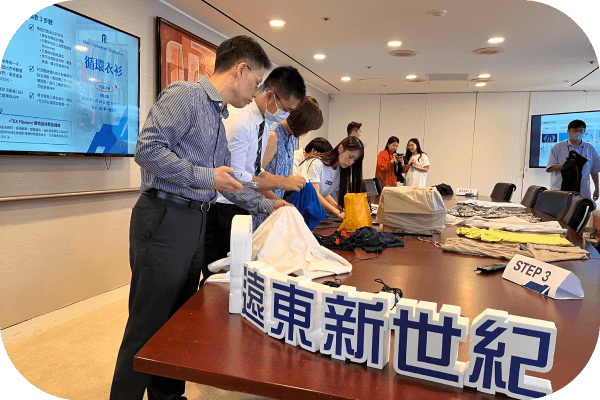The March Towards Net Zero: FENC’s Low-carbon Innovation
FENC is the world’s only manufacturer integrating polyester production from raw materials to end-product recycling. FENC drives low-carbon transformation across materials, processes, and products.
Information disclosed reflects data collected from the reporting year.
According to the Net Zero Tracker, as of February 2025, 144 countries and 1,173 companies around the world have pledged to net-zero emissions. While it is important to establish robust plans and proposals in order to decarbonize, tangible actions are vital. The 29th session of the Conference of the Parties (COP29) to the United Nations Framework Convention on Climate Change was held in Baku, Azerbaijan in 2024. The conference focused on issues such as accelerating carbon reduction; climate finance; energy transition; climate adaptation; nature conservation; climate technology and innovation to keep the global community on course for the 1.5°C pathway. During COP29, Dr. Ching-Ying Yu, Associate Professor from Yuan Ze University, an affiliate under Far Eastern Group, delivered two addresses at the Blue Zone, where the official sessions and formal negotiations took place. Dr. Yu centered her talks around FENC’s circular economy products and carbon reduction performance. During the two speeches, she highlighted FENC’s approach of tackling the climate impact head-on, monitoring the latest development of international trends and implementing a host of carbon reduction actions, which have won the Company international fame for its green innovative power.
The Net-zero Pathway
FENC began setting its GHG reduction targets in 2022. The Energy Task Force, FENC’s designated environmental and energy management entity, is charged with coordinating the implementation of a broad range of progressive carbon-reducing actions. In 2023, through concerted efforts from all departments, FENC reduced 25% GHG emissions compared with the base year, achieving its near-term target well ahead of schedule.
To align with the international trend to move towards carbon reduction and bolster its competitiveness in the net-zero era, FENC raised its carbon reduction targets in 2024, aiming for 30% carbon reduction by 2025 and 50% by 2030. With 1,598 ktCO2e of GHG emissions recorded for 2024, a drop by 34% from the base year, FENC has yet again achieved the new near-term target ahead of schedule.
To achieve the 2030 GHG reduction targets, FENC is planning to devote an investment exceeding NT$15 billion between 2020 and 2030, which is expected to reduce 1.65 million tCO2e in carbon emissions. The performance of the 2024 energy and emission reduction projects is included in GHG Management-Energy and Carbon Reduction .
- GHG emissions data includes Scope 1 and Scope 2, covering 100% of the major sites of the production business, with 2020 as the base year.
- FENC does not use carbon offsets as the means to achieve its GHG reduction targets.
The Low-carbon Transition Targets
To support the net-zero vision and inspire decarbonization throughout the industry chain, FENC has established a new set of low-carbon transition targets in 2024: reducing GHG emissions by 50%; incorporating 50% green raw materials; including 50% green products in the product mix by 2030. The Company is charting the course for a total transformation to embrace low-carbon raw materials, production and products, steering the industry to co-create a green future.
GHG emissions
Green raw materials
Green products
in the product mix
Implementation Progress of Low-carbon Transition Strategies
- FENC averted 33,003 tCO2e in GHG emissions in 2024 by improving energy efficiency through the optimization of the production process, facility and energy management.
- OPTC is scheduled to complete the transformation of production processes in 2026. The transformation will facilitate electricity generation from the production process, thus reducing energy purchase from external sources and averting 80,000 tCO2e of carbon emissions per year.
- In 2028, a 25 MW cogeneration system will be completed in Vietnam. The system will generate thermal energy to fuel both steam and electricity generation, which will improve fuel efficiency.
- The high-emission coal-water slurry and heavy oil boilers have been phased out and replaced by lower-emission natural gas boilers.
- FEPV-Knitting and Dyeing Plant reduced carbon emissions by 35,778 tCO2e in 2024 by using biomass fuels, including wood chips and rice grains.
- FEPV-Knitting and Dyeing Plant is increasing the biomass fuel substitution rate with 85% estimated in 2025 and 100% expected in 2026.
- Efforts will continue in the R&D of the application of hydrogen energy and biomass fuels.
- As of the end of 2024, a total of 12 production sites in Taiwan, mainland China and Vietnam had installed solar power generation equipment with 21,960 kW in capacity. A total of 24.06 GWh of solar power was generated for self-consumption and approximately 200 GWh of renewable electricity was purchased during the reporting year, reducing a total of 110,908 tCO2e in carbon emissions.
- Renewable electricity will be acquired through means such as long-term electricity purchase agreements. FENC will also continue expanding the installed capacity of renewable power generators at its worldwide locations for self-use. It is anticipated that renewable electricity consumption across FENC’s global locations will reach 250 GWh by 2025.
- FENC pioneered the world's first waste gas recycling technology applied towards polyester production. After capturing waste gas recovered from steel mills, the microbial fermentation technology is applied to convert the waste gas to ethanol, which is then transformed into polyester products.
- In 2024, FENC partnered with Oriental Union Chemical Corp. and developed eco-friendly solvents and non-ionic surfactants containing carbon dioxide. The breakthrough marked a success in carbon capture and reuse. Additional details are provided in Special Report Innovative Applications x Green Raw Materials x Visionary Deployment
.
- Additional applications will be developed for the waste gas recycling technology.
- FENC is establishing the Emerging Technology Carbon Reduction Team to extend the Company’s efforts in the research of information and practices in the field. Plans are underway to capture carbon dioxide directly from the emission source for conversion into usable products.
- Research projects on carbon capture and microalgae cultivation technologies are in progress. The plan is to recover waste gas from the exhaust pipes for the cultivation of microalgae, which will be used as the raw material for feed processing.
- Low-emission alternatives for raw materials, including recycled and biomass materials, have been adopted to help reduce carbon emissions in the value chain (scope 3).
- In 2023, OPTC formed a R&D partnership with the supply chain and pioneered the first bio-PTA, and the plant has signed a memorandum of understanding for the supply of biomass raw materials. FEIS purchased recycled bio-MEG to produce low-carbon polyester.
- Recycled raw materials: As a global leader in recycled polyester, FENC will realize its vision of strengthening the circular economy by transforming waste into valuable raw materials. Additional details are provided in Special Report Innovative Applications x Green Raw Materials x Visionary Deployment
.
- Biomass raw materials: The R&D efforts will continue to create biomass polyester materials that can be scaled and commercialized. Additional details are provided in Green Products
.
Value Chain Engagement
The New Taipei City Government held the New Taipei Sustainability Workshop in September 2024, which was organized by the Global Views Monthly. Allen Sha, Executive Vice President of Corporate Staff Office, was invited to share how FENC helped the public embrace a lifestyle of sustainability and circularity. During the event, he discussed the action plans for sustainable development with the green collar talent from multiple departments under the New Taipei City Government and explored opportunities for public-private partnerships to foster the circular economy and low-carbon transition.

FENC’s ambition to decarbonize is unrivaled within the industry. In 2019, FENC began implementing the Task Force on Climate-related Financial Disclosures (TCFD) to assess the impact of its business activities. The disclosures had been made public annually in the FENC Sustainability Report and its official website. In 2023, FENC published the first TCFD report in Taiwan in reference to the International Financial Reporting Standards Sustainability Disclosure Standards S2 Climate-related Disclosures. On August 21, 2020, FENC signed on to become a supporter of TCFD, making the Company the first corporation in the traditional industry in Taiwan to sign and publish such a statement of support.
The carbon reduction targets submitted by FENC’s Polyester Business and subsidiary OTIZ received the approval of the Science Based Targets Initiative (SBTi) in June 2024 and March 2024, respectively. With the action, both were declaring their pledge to achieve the near-term targets and reach net zero through the 1.5°C pathway. In October 2024, the Textile Business submitted the letter of commitment to SBTi, ready to contribute to net-zero emissions.
The platform, Temperature Rising Index for Pathways, from the CommonWealth Magazine calculates the contribution of the carbon reduction commitment from nearly 1,000 Taiwanese companies to taming global warming. Among these companies, only 20% are committing at a level qualified as meeting the 1.5°C pathway outlined in the Paris Agreement, and FENC leads the pack by establishing a 1.440°C pathway.

On April 8, 2024, FENC was approved by the Industrial Development Administration, Ministry of Economic Affairs to participate in the project, 1+N Low-Carbon and Smart Transformation and Upgrade for Small and Medium-sized Manufacturing, with Hsinpu Chemical Fiber Plant leading a team of four collaborating plants and six diffusion plants to promote carbon reduction. The team focused on the optimization of equipment, production and energy, as well as developing raw material alternatives. The goal is to establish plans to create low-carbon technologies for the entire polyester production process, develop low-emission production, and maximize energy and resource efficiency. The program is expected to reduce carbon emissions by 30,000 tCO2e.
FENC is proactive with its customer engagement efforts. For downstream customers, the Company promotes the use of low-carbon products as raw materials. Product life cycle assessments and product carbon footprint certification are completed and provided to customers as reference data regarding FENC’s decarbonization efforts. As international brand customers started requiring SBTi compliance in terms of carbon reduction targets, FENC’s business units joined SBTi and obtained its approval for setting the most ambitious carbon reduction targets among industry peers. The disclosure of environmental data is made available to brand customers monthly to validate FENC’s efforts and performance in environmental management.

During the marathon and employee competition held by FENC in October 2024, the Company provided functional jerseys made of chemically recycled waste textiles to the runners and employees. The Corporate Management in the Taipei headquarters also launched an energy and carbon reduction campaign, which included clothing donations. A total of 700 pieces of second-hand clothing were recycled and remanufactured into apparel items through FENC’s textile recycling operation. The campaign also included an initiative involving the Carbon Reduction Passbook application. The application encouraged employees to take public transportation and walk, helping them set carbon reduction targets and incorporate a low-carbon lifestyle.









